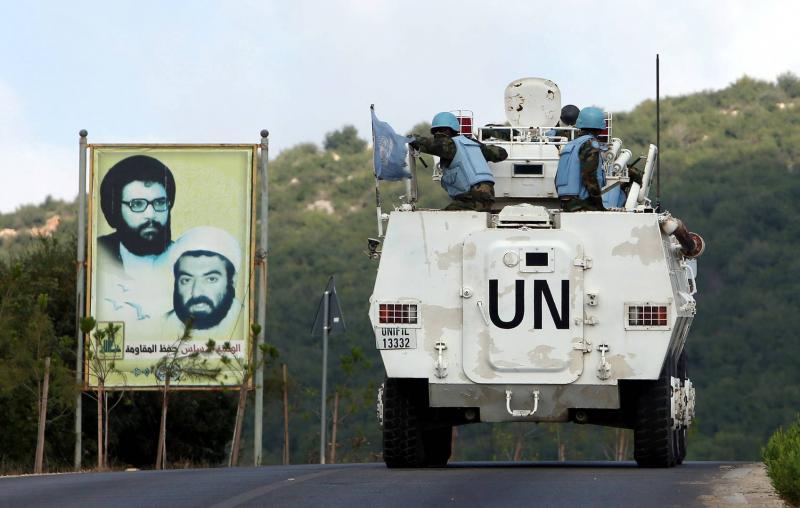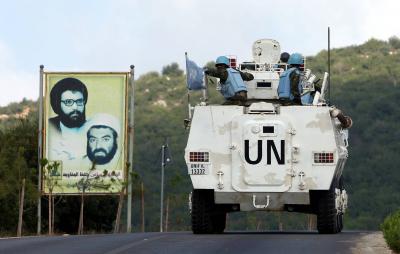All political and diplomatic initiatives aimed at defusing the situation on the Lebanon-Israel border focus on implementing Resolution 1701, which was adopted by the United Nations Security Council on August 12, 2006, and brought an end to the Israeli war on Lebanon. Experts agree that "Israel's and Hezbollah's violations of this resolution have caused security tensions between the two parties, culminating in the transformation of southern Lebanon into a support front for Gaza since October 8, 2023."
In fact, violations of the international resolution are numerous. Former Lebanese Interior Minister Ziyad Baroud points out that "since the issuance of Resolution 1701 in 2006, it has not been fully implemented by either side," recalling in a statement to "Asharq Al-Awsat" the "periodic reports issued by the UN Secretary-General, which numbered 52 reports up to last July, detailing extensive violations, especially by Israel, particularly aerial incursions, the abduction of Lebanese farmers, and assaults on civilians."
Baroud states that "after October 7, what remains of the resolution is only the presence of the international peacekeeping forces monitoring violations on both sides." The Security Council unanimously adopted Resolution 1701 on August 12, 2006, calling for a "complete cessation of hostilities in Lebanon." The resolution demanded that Hezbollah "immediately cease all its attacks" and called for Israel to "immediately stop all offensive military operations and withdraw all its forces from southern Lebanon." It urged the Lebanese government to "deploy its armed forces in the south, in cooperation with the UN peacekeeping forces (UNIFIL), coinciding with the Israeli withdrawal, to create a zone between the Blue Line and the Litani River free of any armed individuals and military equipment, except for those belonging to the Lebanese armed forces and UNIFIL." The resolution called for "the full implementation of the Taif Agreement and Resolutions 1559 and 1680, including disarming all Lebanese factions and ensuring that no foreign forces are present without the approval of the government."
### Tabbarah: Violations from Both Sides
There is a consensus on the emptying of the Security Council's resolution of its substance. Former Lebanese Ambassador to Washington, Dr. Riyad Tabbarah, discusses Israel's ongoing violations of Resolution 1701, by land, sea, and air, since 2006 to the present, noting that "the peak of this violation was manifested in Israeli airstrikes deep within Lebanese territory and the assassinations it carried out of Hezbollah leaders, killing civilians."
On the Lebanese side, there has also been a reneging on the resolution's contents. Tabbarah confirms in a statement to "Asharq Al-Awsat" that "Resolution 1701 reiterated the emphasis on implementing Resolution 1559, issued in 2004, which calls for the withdrawal of all non-Lebanese forces from Lebanon, disarmament of militias, and ensuring that no weapons remain except for those of the Lebanese army and legal Lebanese forces, unless with the Lebanese government's approval." Therefore, Hezbollah insists on including the ministerial statements of the army, people, and resistance to justify its armed presence. He also indicates that "the crux of the resolution is the prohibition of any armed presence between the Blue Line and the course of the Litani River, except for the Lebanese army and UNIFIL."
Tabbarah notes that "the international resolution has not been implemented regarding the demarcation of borders and the resolution of disputes over contested points, including the Kfar Shouba Hills and Shebaa Farms."
### Significant Risks
What has been implemented of the resolution has led to "a minimum stability" on the Lebanon-Israel border, as former Interior Minister Ziyad Baroud expresses, seeing the "essential aspect of the resolution is the UN peacekeeping forces' supervision of security along the border. Despite the setbacks it has faced, stability remained acceptable from 2006 until October 7, 2023, after which the resolution's application is suspended until it is renewed or amended and a new resolution is agreed upon."
Baroud emphasizes that "everything sought by the U.S. envoy, Amos Hochstein, as well as the French paper, is a return to implementing the resolution, as deviating from it represents a significant risk," and he does not rule out "the possibility of amendments being made for it to adapt to the post-war phase."
### Espionage Networks and Assassinations
Meanwhile, the implementation of the resolution remains modest compared to the scale of violations. Ambassador Tabbarah lists the most significant implemented provisions, primarily "Israel's execution of the withdrawal from the areas it entered during the 2006 war and the release of Lebanese prisoners from Israeli jails, which occurred as part of a swap deal involving the bodies of soldiers captured by Hezbollah during an operation it conducted at the Blue Line on July 12, 2006, which was the cause of that war, as well as the implementation of the deployment of the Lebanese army with UNIFIL forces, even though the number of army personnel did not reach 15,000 soldiers and officers, as stipulated by the resolution."
Alongside the halt in military operations on the front, security operations did not cease, as Israel succeeded in recruiting spy networks operating in its favor in Lebanon, with some managing to infiltrate the tight-knit circle of Hezbollah and carry out assassinations that resulted in the deaths of leaders from the party. The Israeli state also executed a significant number of Hezbollah leaders in Syria, most notably military and security leader Imad Mughniyeh in Damascus on February 12, 2008, followed by the killing of his son Jihad and freed prisoner Samir Quntar in the Quneitra area adjacent to the occupied Golan Heights on January 18, 2015, before the support front ignited, and Israel proceeded to assassinate Hamas leader Saleh Al-Arouri in the heart of the southern suburb, followed by the assassination of several military and field leaders from the party, the last of whom was Taleb Abdullah, known as "Abu Taleb," who is considered the highest military leader after Imad Mughniyeh.




